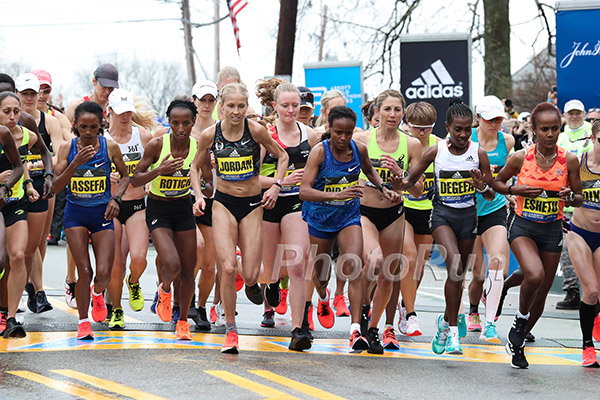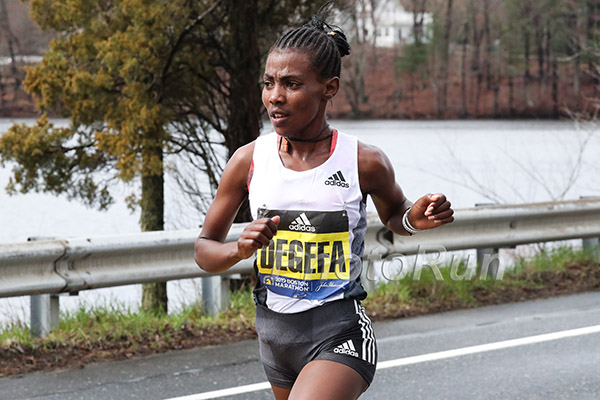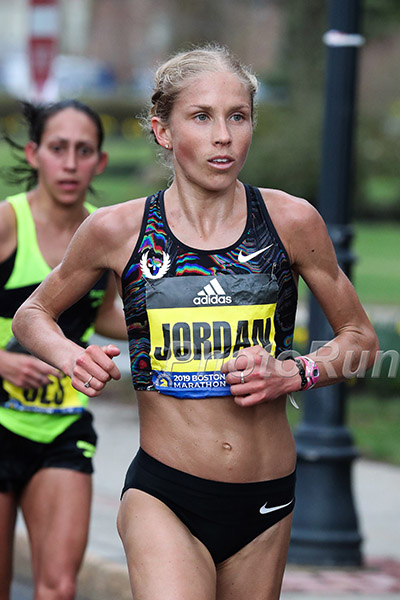More Coverage Links:
Coverage Homepage
Post Race:
Men's Race and Commentary
Women's Race and Commentary
Complete Searchable Results
Race Day: As It Happens - Live Coverage (the real-time notes/mile-by-mile)
Pre-Race:
Race Preview & Starter Lists |
Elite Athlete Past Matchups |
Prize Money
Athlete Bios:
International Men | American Men | International Women | American Women
Weekend Experience:
Pace Calculator/Spectator Guide |
Course Experience As a Runner
Extras:
Athlete/Course Videos |
Boston Marathon Books
More News: Press Releases |
News
The 123rd Running of the Boston Marathon - The Women's Race
by Star Blackford
Overview
The women's race at the 2019 Boston Marathon was all about Worknesh Degefa.
While the story leading up to the race looked like it might again be the weather, the start of the elite race went off at a dry 54 degrees with a 14-mile per hour tailwind. With weather no longer a controlling factor, the front of the starting pack included the expected favorites: Degefa, Meskerem Assefa, Mare Dibaba and Biruktayit Eshetu; past champions Caroline Rotich, Edna Kiplagat and Des Linden; and American favorites Sara Hall, Jordan Hasay and Lindsay Flanagan.

The Start of the Women's Race
photo credit: Victah Sailer/PhotoRun |
The Race: Until Degefa's Big Break
Through the first 5K, Hall and Eshetu seemed to trade places at the very front of the pack though the all the women still seemed to be shaking out positions. Hall made a notable move to the front just after mile 2, when she and Linden looked at their watches and both seemed disappointed. It also seemed for a mile or two that Hall, Linden and Hasay might be working together to stay just ahead of Degefa, an obvious threat with the fastest PR in the field by nearly two minutes.
Though there were still nineteen women in the lead pack through the first elite water stop at mile 4, the women were stretched across the road and, with the exception of Linden, not running the tangents. Degefa, after sharing a water bottle with Eshetu, pulled away from the pack and threw the first real surge of the day. Dibaba and Sharon Cherop followed close behind with about a five second gap; the chase pack ran a few seconds more behind. By mile 6, Degefa had stretched her lead to fourteen seconds ahead of Cherop and Dibaba, with a 2:23 projected finish time; she would increase her lead to 35 seconds at mile 7, nearly a minute by mile 8, and a full 1:34 by the 15K mark. There were now two obvious questions: if Degefa could hold this pace for the duration of the race, and how her previous marathon experience, limited to the flat and fast Dubai Marathon course, would translate on the Newton Hills.
The Rest of the Race
While Degefa continued to run away with the win, the race for second and third continued behind her in a pack of twelve women, among them Cherop and Dibaba, past champions Kiplagat and Rotich, and Americans Linden, Hall, Hasay and Sally Kipyego, who had worked her way to the chase pack.
We would later learn that Hasay had been quite anxious about Dibaba and Cherop's early breakaway and considered going with Dibaba and Cherop; Linden, who would note that "we are already running as Team USA," reassured Hasay that she was in the right place and needed to remain patient. Hasay would also reflect later that once the pack had caught Dibaba and Cherop, and further included three past champions, her anxiety about staying with the pack would be reduced as she realized that "all these women are great and former champions, and they want to win too."

Worknesh Degefa Runs Alone
photo credit: Victah Sailer/PhotoRun |
Degefa's Early Domination
Degefa by the halfway point had increased her lead over the chase pack to 2:28, with a Half Marathon split of 1:10:40, translating to about a 2:21 finish time. Shockingly, she continued to increase the pace past the Half Marathon point, at one point on track for a sub-2:21, which would have been the fifth fastest women's finish in the event's history, and the fastest women's time at Boston since 2014. She again increased her lead through mile 15, leading the chase pack by 2:43 while heading toward the Newton Fire Station. At the same point, with Degefa out of sight, Linden began to run to the far side of the pack and looked for a moment to be in trouble. She instead returned to the pack and began to push the pace, whittling the chase pack down to herself and six other women: Kiplagat, Rotich, Eshetu, Dibaba, Betsy Saina and compatriot Jordan Hasay. Shortly after, Linden would slip to the back of the chase pack and begin to fall off.
Degefa, meanwhile, continued her solo run through Newton. Though she appeared to grit her teeth at the Newton Fire Station and questions remained about her lack of experience on the Newton Hills - as well as the fact that she had admittedly not previewed the course - she continued to push toward a 2:21 finish time. While she did run notably slower splits through the Newton Hills (5:45 and 5:47 compared to the 5:25's and 5:30's she had been running before), she showed few signs of fatigue, save checking her watch a bit more often, and the chase pack behind her was further disintegrating. With fewer and fewer people to chase her and fewer and fewer miles to work with, it was becoming increasingly clear that Degefa had run away with the race - and that the field, knowingly or not, had let her.
Kiplagat Makes Her Move - But Sadly, Too Late
The chase pack, reduced to three by mile 22, now consisted only of Kiplagat, Assefa and Hasay, each strung out by several seconds. Kiplagat was remained a full 2:26 behind Degefa but appeared to increase her pace.
While Degefa's form would show some small signs of deterioration over miles 23 and 24, she continued to run consistently as Kiplagat continued to push. Degefa, however, was simply not slowing enough to help Kiplagat close the gap, and it was clear that Kiplagat could not catch Degefa unless she slowed dramatically. Degefa, instead, slowed only by seconds per mile, and by mile 24, it was clear that she would win. While Kiplagat would eventually able to sight her on Boylston Street, she would be out of both time and real estate; Hasay, between miles 23 and 24, would pass Assefa for a strong comeback in her first marathon in eighteen months. Linden kept up the fight as well, moving into fifth position over the final miles.
The Finish Line
Degefa would win her fourth career marathon and first outside of Dubai in 2:23:31. Kiplagat would run a swift final 5K, dropping her mile pace as low as 5:15, to finish in a second place 2:24:13, with American Hasay repeating as third-place finisher in 2:25:20.
The Top Ten
Defending Champion Des Linden would hold on for a 2:27:00 fifth-place; a third American, Lindsay Flanagan, would also break the top-10 women, finishing in ninth place at 2:30:07. The top ten was rounded out by expected top finishers Meskerem Assefa (4th, place in 2:25:40). Caroline Rotich (6th place in 2:28:33), Mary (Wacera) Ngugi (7th place in 2:58:33), Biruktayit Eshetu (8th place in 2:29:10) and Betsy Saina (10th place in 2:30:32). Of note, the top four finishers came from the five starters who had a 2:20 or faster personal best; Boston often favors the toughest runners rather than the fastest, adding an element of the unexpected as the race unfolded (as the fastest rarely simply run fast and win).

Jordan Hasay - Top American
photo credit: Victah Sailer/PhotoRun |
Looking Forward to the 2020 U.S. Olympic Trials - What Did We Learn?
The greatest takeaway seems to be that Hasay is recovered, healthy and ready to take her place as the USA's most dominant distance runner. To that end, Hasay announced following Boston that she will not only be running the Bank of America Chicago Marathon this fall, but that she's looking to break the American women's record. Post-race, Hasay was confident and rejuvenated, and while she repeated several times that she is still "a student of the marathon," also seemed eager to apply the lessons she's learned during her layoff and return to near-peak fitness.
Linden, Flanagan and Hall all ran respectable races, though Linden and Hall in particular may have hoped to finish in better position. Becky Wade, another top American, finished in 2:36:14, a bit over a minute slower than her Virgin London Marathon finish of 2:35:01, but likely reflective of Boston's difficulty compared to London's. And, with London itself just two weeks out and phenoms Molly Huddle and Emily Sisson set to compete, Boston is but one puzzle piece as we move ever closer to February. One thing, however, is certain: if Hasay remains healthy, she'll run her first marathon as an Olympian in Tokyo.
Top Finishers:
1. Worknesh Degefa (ETH) 2:23:31 - $150,000
2. Edna Kiplagat (KEN) 2:24:13 - $75,000
3. Jordan Hasay (USA) 2:25:20 - $40,000
4. Meskerem Assefa (ETH) 2:25:40 - $25,000
5. Desiree Linden (USA) 2:27:00 - $15,000
6. Caroline Rotich (KEN) 2:28:27 - $12,000
7. Mary Ngugi (KEN) 2:28:33 - $9,000
8. Biruktayit Eshetu (ETH) 2:29:10 - $7,400
9. Lindsay Flanagan (USA) 2:30:07 - $5,700
10. Betsy Saina (KEN) 2:30:32 - $4,200
11. Fionnuala Mccormack (IRL) 2:30:38 - $2,600
12. Sharon Cherop (KEN) 2:31:41 - $2,100
13. Kate Landau (USA) 2:31:56 - $11,800
14. Bridget Belyeu (USA) 2:34:25 - $1,700
15. Sara Hall (USA) 2:35:34 - $1,500
16. Alyson Dixon (GBR) 2:35:43
17. Becky Wade (USA) 2:36:14 - $5,000
18. Hilary Dionne (USA) 2:36:21
19. Sarah Sellers (USA) 2:36:42
20. Margaret Njuguna (KEN) 2:38:04
21. Bria Wetsch (USA) 2:38:10
22. Kate Pallardy (USA) 2:38:27
23. Sarah Pease (USA) 2:39:08
24. Kimi Reed (USA) 2:40:12
25. Dawn Grunnagle (USA) 2:40:26 - $2,500
26. Caitlin Chrisman (USA) 2:40:29
27. Nami Hashimoto (JPN) 2:40:41
28. Dot Mcmahan (USA) 2:40:45 - $1,500
29. Michele Lee (USA) 2:41:02
30. Paula Pridgen (USA) 2:41:36
|







